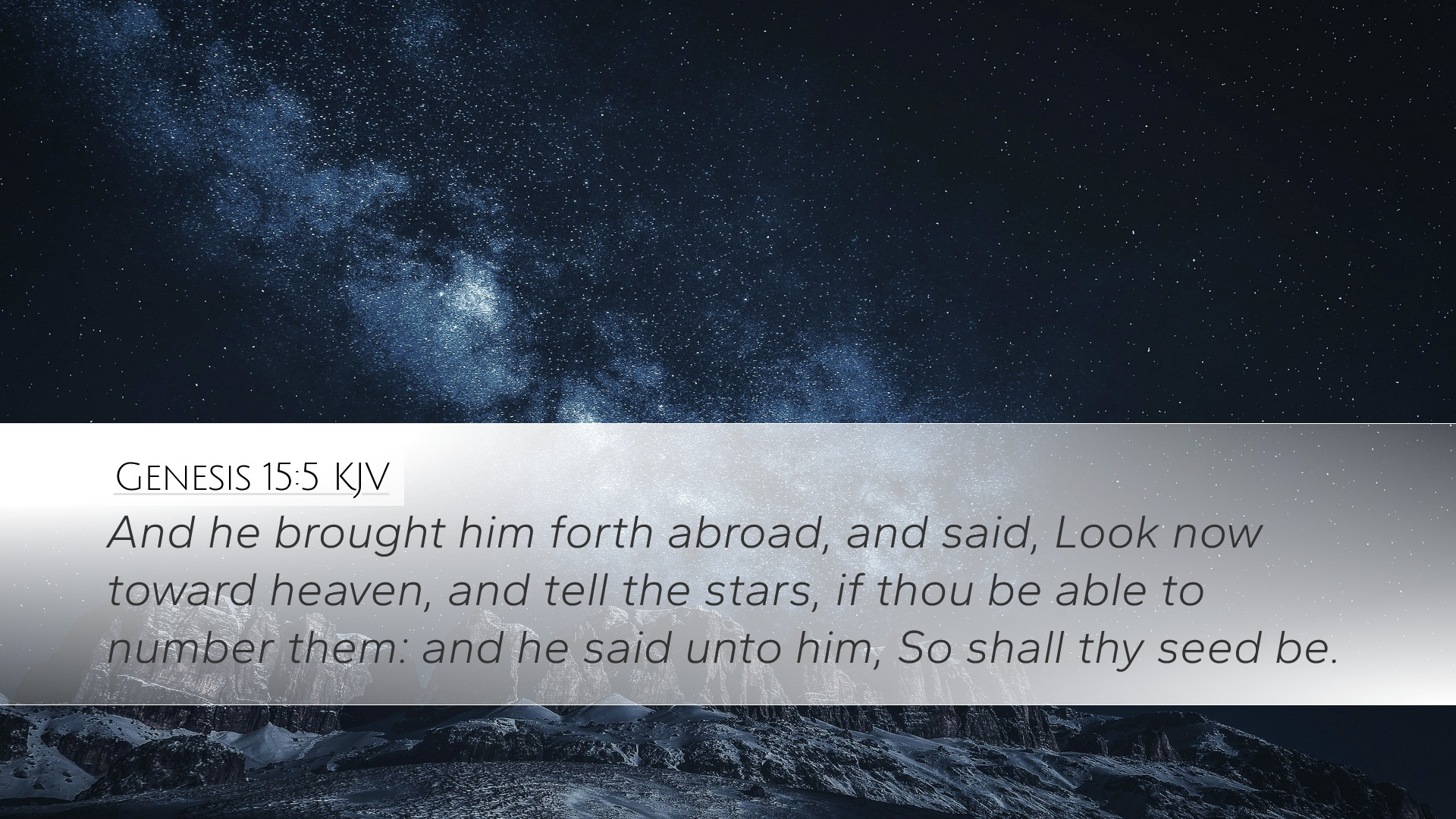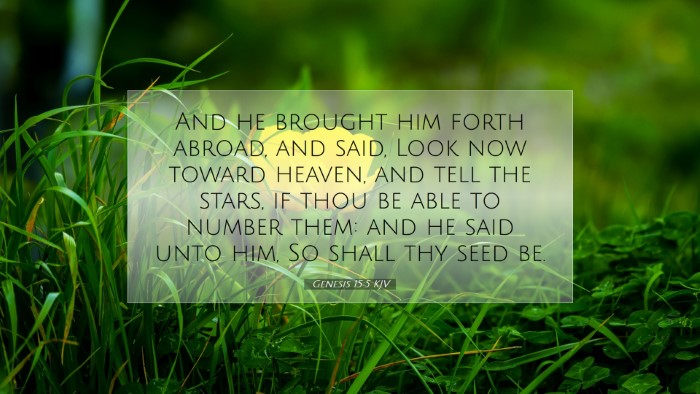Commentary on Genesis 15:5
Genesis 15:5 presents a pivotal moment in the life of Abraham (then Abram), as it encapsulates God's promise regarding his descendants. The verse states:
"And he brought him forth abroad, and said, Look now toward heaven, and tell the stars, if thou be able to number them: and he said unto him, So shall thy seed be."
Contextual Background
Before diving into the verse, it is essential to understand the larger narrative of Genesis 15. This chapter unfolds the covenant relationship between God and Abraham, marking a significant juncture where God reassures Abraham during a time of fear and uncertainty. Abraham's earlier concerns regarding his lineage are met with divine promises that span beyond human comprehension.
The Divine Initiation
Matthew Henry’s Commentary emphasizes that God takes the initiative in reinforcing His covenant with Abraham. This act signifies not only the importance of faith but also God's sovereignty in establishing His will on earth. Henry notes:
“It is God who leads Abraham out to witness the vastness of His promises.”
Looking to the Heavens
When God tells Abraham to “look now toward heaven,” it serves multiple purposes:
- Praise for Creation: Albert Barnes remarks on the beauty of the night sky, highlighting how the stars symbolize the myriad ways in which God can fulfill His promises.
- Invitation to Faith: This act of looking up invites Abraham (and the reader) to contemplate beyond earthly constraints. Adam Clarke emphasizes the need for faith to grasp the enormity of God's intentions.
- Understanding the Unmeasurable: The stars’ uncountable nature signifies the unmeasurable blessings that God intends for Abraham’s descendants.
Counting the Stars
The command to “tell the stars, if thou be able to number them” is profoundly symbolic:
- Human Limitation: The inability to count the stars reflects human limitations in fully grasping or understanding God’s promises. Barnes notes that this serves as a reminder of the infinite possibilities with God.
- Multiplicity of Blessings: The numerous stars represent the vast multitude of Abraham’s future descendants, as elaborated by Henry.
- Encouragement in Waiting: Abraham’s obedience in looking up serves as a model for believers: patience and trust in God’s timing.
So Shall Thy Seed Be
The concluding phrase “So shall thy seed be” encapsulates the verse's core promise:
- Assurance of Posterity: God emphatically assures Abraham of a significant lineage. Clarke connects this promise to the coming nations and the ultimate fulfillment in Christ.
- The Covenant of Faith: This moment reinforces the covenant established in Genesis 12 and reinforces the importance of faith in receiving God's promises.
- Spiritual and Physical Descendants: The promise extends beyond biological lineage to encompass spiritual descendants through faith, highlighting a spiritual dimension that remains relevant in Christian teaching.
Theological Implications
This verse invites deeper reflection on several theological themes:
- The Faithfulness of God: As noted by Henry, God’s character is demonstrated as He remains faithful to His promises, despite the apparent barrenness of Abraham's situation.
- Faith and Righteousness: The context surrounding this event emphasizes the theme found later in Romans 4, where Abraham's faith is accounted as righteousness. This connection has profound implications for the doctrine of justification.
- The Nature of God’s Promises: The vastness of the stars symbolizing God’s promises indicates the limitless nature of what He can accomplish through those who believe.
Applications for Today
For pastors, theologians, and students of the scripture, Genesis 15:5 holds vital applications:
- Encouragement in Trials: Just as Abraham faced uncertainty, believers today are reminded to trust in God’s promises despite current circumstances.
- Vision for Multiplication: The call to view the stars encourages the church to envision God’s expansive plans for growth, both numerically and spiritually.
- Trust in God’s Timing: This verse serves as an encouragement to await God’s fulfillment of promises, reinforcing the importance of faith in the Christian walk.
Conclusion
In summary, Genesis 15:5 serves as a rich theological tapestry interwoven with promises, faith, and assurance. The insights drawn from public domain commentaries by Matthew Henry, Albert Barnes, and Adam Clarke illuminate the layers of meaning present within this singular verse. As we reflect on Abraham’s journey, may it inspire a deeper trust in God’s promises for all generations to come.


